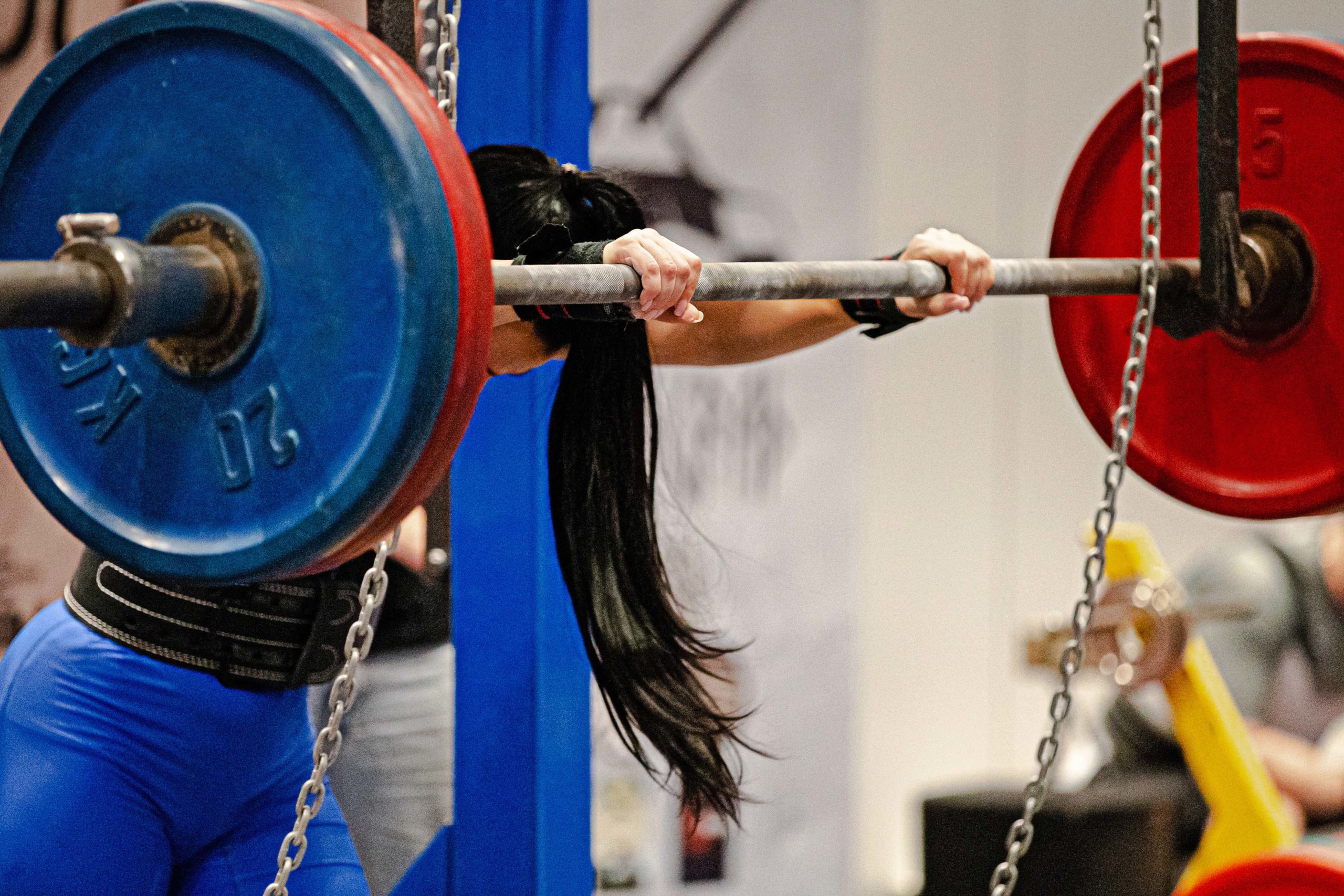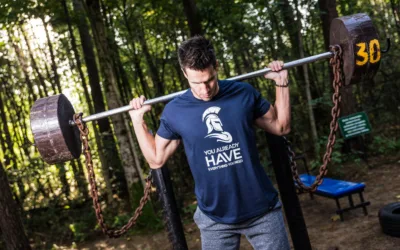3 Mistakes Newbie Powerlifters Make Before Their First Meet
If you’re thinking about competing in your first powerlifting meet, even if it’s a faraway notion, take heed. It pays to learn from the screwups made by athletes who have done it before you, especially in a competition format.


Written By
STEPHANIE BUENDIA
Stephanie Buendia is a competitive powerlifter, personal trainer, and strength coach based out of Long Island, New York. She helps athletes of all skill levels create healthier lifestyles by focusing on strength training, habit tracking, and mindset building. Listen to her advice before you jump into your next meet!
Powerlifters Are People, Too
With the start of my newest strength training cycle, I got to thinking about my last big powerlifting meet and the lessons I’ve learned since then.
The last time I competed was at the XPC Finals at the Arnold Sports Festival in 2018. I had my heart set on competing there since I first started powerlifting three years earlier so it was a big deal to me.
Even though I’m proud of my performance, looking back and knowing what I know now, I feel like I made a few key mistakes that left a lot on the table. As a coach, I notice a lot of athletes falling into these same traps, which means I repeat the same advice in order to pull them out.
Here’s a chance for newer lifters to learn from some of the mistakes I’ve made in my powerlifting career, so they can avoid the negative impact on their training, progress, and meet total.


Mistake #1: Underestimating the importance of sleep and recovery.
I was so focused on making it to the Arnold that I became an expert at ignoring every sign my body was telling me to slow down and rest. I had a really packed-out work schedule and I underestimated how much of that daily fatigue would impact my training. I wasn’t sleeping enough and I didn’t take my rest days seriously.
I also made the big mistake of not being totally honest with my coach about how I was feeling. Instead, I ignored my fatigue and just kept pushing while he unknowingly kept increasing the volume. Training began to feel more difficult which had me dragging my feet and I found myself getting sick more often, especially around heavier training blocks.
Hard physical effort causes fatigue to accumulate, which, if left unchecked can lead to a decrease in performance, motivation, and immunity. When this happens it means you have failed to properly recover. Without adequate rest, you will not be prepared to satisfy the parameters of your training program.
Lack of recovery ultimately means fewer gains over time. So, think again before skipping that rest day and get some GOOD sleep, because you are not doing yourself any favors without it.
Mistake #2: Not training with strong(er) people (than you).
Training around the right people and atmosphere makes such a big difference, especially if you want to take your lifting to the next level. The most impactful game-changer for me was seeing other strong women of all ages and sizes moving heavy weight. You just don’t typically see too many women at the local globo gym bench pressing 135lbs as a warm-up set.
This opened my eyes to what’s possible for me and drove me to push hard every session. I’ve been fortunate enough to be part of some really great training teams and crews that not only put me in proximity to some of the strongest people I’ve ever met, but athletes who had the experience of going to big meets like Worlds and USAPL Nationals.
Seeing people in my circle crush it at these really big meets was extremely motivating. As for the lifting sessions? The energy was simply unmatchable, especially around meet time. Compared to the experiences I’ve had in commercial gyms, it’s just not the same. Everyone usually keeps to themselves.
Surround yourself with a community of like-minded people, because it makes all the difference. I promise you won’t regret it.


Mistake #3: Dwelling on missed lifts.
This is a big one, because it can carry bad mojo into your training sessions and meets. I’ve seen some great lifters turn against themselves after a failed lift and just let the rest of the meet or workout go down the drain. It also sucks for the people around you to absorb that negative energy, watching you huff and puff over a missed lift. It ruins the mood, which is the last thing you want to happen at a meet. Don’t be that person.
If you want to be successful in powerlifting, you can’t let missed lifts and bad training sessions get in your head so much that it impacts your future performance. Powerlifting is a marathon, not a sprint. Missing lifts and getting trashed by workouts is part of the game. It’s all about how you power through them and handle disappointment.
At one point, I plateaued on my bench press at 135lbs for an entire year, but I never stopped benching. Once you reach a certain level of strength, it can take a long time to set a new PR. You have to learn to master the art of “shaking it off” — don’t let one bad moment infect the next one. Be aware of self-doubt and negative self-talk, because it will drain your energy. Refuse to let your negative self-talk become a self-fulfilling prophecy.
It’s better to view each lift as independent from the other. One bad lift should not determine the rest of your meet or training session. Take every “bad” training session and missed lift as an opportunity to learn about what you can do better. Sometimes, it’s as simple as taking an extra rest day or scaling back on volume.
Above all, get a good coach and rely on them to help you through your sticky training points. As long as you remember that the relationship is a two-way street. You need to hold up your end of the deal, take care of your body, check your mindset, and leave everything on the floor at your first meet. (Well, hopefully off the floor, then back on it. You get the idea.)
Remember these mistakes when you catch yourself slacking! Being aware of how you approach your training before a meet could mean the difference between a failed lift and a new total!
You Work too Hard to Not See Progress
Find Your Perfect Training Plan
Options for Every Goal
Training plans from real coaches covering any goal, fitness level, and number of sessions per week.
The Best Coaches
Get coached by the best. Olympians, ex-NFL stars, Titan Games Winners, Sport Scientists and more.
Starting at $1/ day
With many options including a free 7 day trial, you can try out programming before you commit.
Related Articles
You May Also Like...
Slow Reps vs. Fast Reps
You’ve probably noticed that some people in the gym tend to perform their reps as fast as possible, whereas others take a slow and controlled approach. But which is better? Dr. Andy Galpin is a Professor of Kinesiology at the Center for Sport Performance at California...
How to Do Leg Extensions Without a Machine
Short shorts are the new stinger tanks. Rocking those big tree trunks with canyon deep cuts is so hot. Leg extensions are a bodybuilding staple—they isolate your quads, the front-facing muscle group of your thighs, by flexing (bending) and extending (straightening)...
Tried-and-True Methods to Fix Plantar Fasciitis
What is Plantar Fasciitis? If you’re new to running or returning to it after a break, you might have been blighted by plantar fasciitis, a fancy name for an annoyingly common foot problem. It’s when the band of tissue that connects your heel to your toes (the plantar...
Slow Reps vs. Fast Reps
You’ve probably noticed that some people in the gym tend to perform their reps as fast as possible, whereas others take a slow and controlled approach. But which is better? Dr. Andy Galpin is a Professor of Kinesiology at the Center for Sport Performance at California...
How to Do Leg Extensions Without a Machine
Short shorts are the new stinger tanks. Rocking those big tree trunks with canyon deep cuts is so hot. Leg extensions are a bodybuilding staple—they isolate your quads, the front-facing muscle group of your thighs, by flexing (bending) and extending (straightening)...


Want more training content?
Subscribe
For Coaches
For Athletes
About
Support
Training Lab
Access the latest articles, reviews, and case studies from the top strength and conditioning minds in the TH Training Lab!
Made with love, sweat, protein isolate and hard work in Denver, CO
© 2024 TrainHeroic, Inc. All rights reserved.





